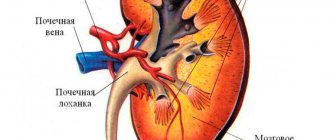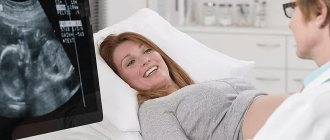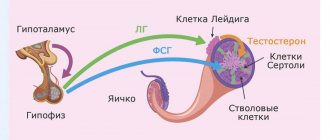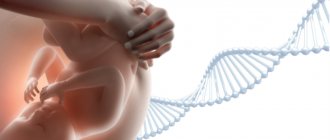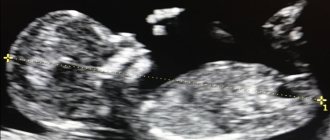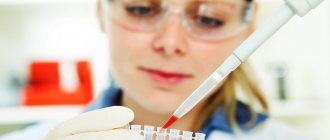Pregnancy management in the 2nd trimester includes a wide range of tests, diagnostic procedures and medical supervision that are necessary to monitor the health of the expectant mother and baby. The second trimester begins with 13th week
pregnancy (gestation), and ends on
the 28th
.
At this stage, a woman should visit a gynecologist at least once every 3 weeks
and closely monitor such vital signs as: blood pressure, weight, blood glucose, protein, iron, abdominal circumference, etc. The pregnancy management program at the Pirogov clinic was developed in in accordance with the requirements of the Ministry of Health of the Russian Federation and does not include “unnecessary” studies. We will carry out all the diagnostics ourselves - quickly, without queues, using new generation equipment. At your service are caring and experienced obstetrician-gynecologists who worked in maternity hospitals in St. Petersburg and improved their qualifications in clinics in Europe and the USA. Our doctors are always in touch and ready to provide not only medical care, but also support, as well as help with choosing a maternity hospital and obstetrician. Managing pregnancy under the guidance of sensitive and attentive doctors allows you to promptly identify abnormalities in the development of the fetus (threat of miscarriage, abnormalities in fetal development) and correct them on an outpatient basis.
How does the fetus develop in the 2nd trimester of pregnancy?
The period from 13 to 28 weeks of pregnancy (fetal, fetal) is characterized by the fact that the active growth of the baby continues, whose internal organs are already partially formed. Following the nervous system, the endocrine system begins to develop: the thyroid gland, pituitary gland, adrenal glands. The fetus noticeably increases in size, so the woman’s tummy becomes rounded. If previously it was possible to notice the baby’s movements only on an ultrasound, now his movements and tremors become noticeable in everyday life.
Also, if in the 1st trimester of pregnancy a woman experienced toxicosis (nausea), then in the 2nd trimester the symptoms become less noticeable. The tone of the autonomic nervous system changes. At the same time, the expectant mother may notice mood swings: most often this manifests itself in drowsiness, tearfulness, dizziness and even headaches. In the 2nd trimester of pregnancy, the risk of miscarriage decreases. If all recommendations of specialists are followed, and there are no deviations, this is a relatively calm period of fetal development, so there is no need for a large number of examinations.
A weight gain of 300-400 grams per week is considered normal weight gain.
Due to the fact that a woman’s uterus continues to grow, her gait and posture change. Due to the increasing load, problems may arise with the veins of the lower extremities (varicose veins) and joints (symphysiopathy - separation of the pelvic bones). Due to changes in the functioning of the adrenal glands, brown pigment may appear on the areolas, linea alba, and facial skin.
How the fetus itself develops in the 2nd trimester of pregnancy (by week):
13th week of pregnancy
- the fetus develops a digestive system, and its own red blood cells appear in the blood. The baby begins to move more actively and can already make swallowing movements.
16th week of pregnancy
- approximately by the end of the 18th week, the organs of the reproductive system are formed in the fetus. Also at this stage, facial expressions develop and improve (the baby can already blink). The child's immune system is strengthened.
Week 19
- most often, the fetal growth already exceeds 25 cm. The cerebral cortex is formed. The slightest exposure to alcohol, nicotine or toxic substances can lead to a child's mental retardation and other irreversible consequences.
21st week
— the fetus’s respiratory system is already practically formed. Around the end of the 23rd week, the formation of the baby’s body is completely completed.
Week 24
- Doctors often talk about physiological arrhythmia of the fetus due to the fact that its heartbeat increases.
Week 28
- the fetus completes the formation of the organs of vision and hearing.
The baby’s growth and development may vary from mother to mother, so an obstetrician-gynecologist can best tell you about it at the stage of prenatal diagnosis, which includes ultrasound, biochemical screening, ECG and other studies.
Preparing for the second screening
This set of examinations does not require special preparatory measures from the woman.
1-2 days before blood sampling, doctors recommend eliminating fatty, fried, spicy foods, chocolate, citrus fruits, and allergenic foods.
For 7-8 hours, you must completely stop eating any food, because... Blood sampling is carried out strictly on an empty stomach! You are allowed to drink still water (not drinks or juices!).
An important point before the examination is to warn the doctor about all medications taken. The doctor will take into account the effect of medications on the body of the mother and child during research and make the right conclusion.
Even less preparation is required before performing ultrasound diagnostics. It is advisable to toilet the groin area, and 2 hours before the examination, stop taking carbonated drinks.
Sometimes doctors recommend drinking 1 - 1.5 liters of still water first in order to fill the bladder. This allows you to achieve the required position of the uterus for high-quality ultrasound examination of the fetus.
Pregnancy management program in the 2nd trimester

The pregnancy management program in the 2nd trimester includes control examinations by an obstetrician-gynecologist (at terms: 14, 17, 20, 23, 25, 28 weeks), a cardiologist, and an ENT doctor. Before consulting an obstetrician-gynecologist leading the pregnancy, the expectant mother takes tests (blood, urine). At the appointment, the obstetrician-gynecologist measures weight, blood pressure, abdominal circumference and gives recommendations necessary for the healthy development of the baby (nutrition and acceptable healthy sources of vitamins, exercise, regimen). At 18-20 weeks of pregnancy, the second stage of screening prenatal diagnostics with ultrasound is performed, which makes it possible to exclude pathologies of fetal development and assess the condition of internal organs (including the placenta). At this stage, the doctor also listens to the fetal heartbeat.
The pregnancy management program in the 2nd trimester includes:
- Appointments with an obstetrician-gynecologist.
- Appointment with a therapist with an ECG.
- Ultrasound examination (ultrasound of the fetus) at 18-20 weeks of pregnancy.
- Laboratory tests of blood, urine, smears, cultures.
- Examination by an ENT specialist: analysis of discharge from the pharynx and nose.
- Biochemical screening (hCG level, ACE, risk assessment, etc.)
- Coagulogram (extended).
More information about the program and cost of pregnancy management in the 1st, 2nd and 3rd trimesters can be found here.
Non-invasive prenatal diagnostics
If there are no restrictions, non-invasive prenatal examination can be performed at 10-17 weeks of pregnancy. Non-invasive DNA screening helps identify and identify possible pathologies or risks of abnormalities in the fetus. The procedure is carried out by drawing blood from the pregnant woman.
A non-invasive procedure is indicated in a number of cases:
- age-related pregnancy (mother's age over 35 years);
- identification of genetic disorders in previous pregnancies;
- the results of a biochemical study showed a high risk of chromosomal pathology;
- if in the pregnant woman’s family there are cases of the birth of children with genetic abnormalities.
There are a number of contraindications for non-invasive diagnostics: cancer, gestational age less than 10 weeks, multiple pregnancy.
Ultrasound in the 2nd trimester of pregnancy
Allows you to see how the baby is developing: examine his arms and legs, count his fingers, and also whether all his organs are formed (heart, lungs, brain) and whether there are any deviations from the norm. The obstetrician-gynecologist also evaluates the condition of the placenta, which performs the most important functions: on the one hand, a protective barrier, on the other, it is responsible for the delivery of nutrients and oxygen to the baby.
Contrary to the popular stereotype, short-term exposure to ultrasonic waves is absolutely safe for the fetus, as confirmed by clinical studies. After all, these are the same sound waves of a certain frequency that we do not catch, but, for example, bats use these waves (and even greater intensity) to fly throughout their lives. An ultrasound machine allows you to visualize soft tissues and vital anatomical structures, which can only be assessed by scanning with these waves. However, you still shouldn’t do ultrasounds too often during pregnancy. As part of prenatal diagnostics in the second trimester, once at 18-20 weeks is enough, it should be the second.
HCG norm in the 2nd trimester of pregnancy

HCG (human chorionic gonadotropin) is called the “pregnancy hormone”. This indicator is very important and needs to be monitored. Too low a hCG level may indicate complications such as threatened miscarriage, frozen fetus, and developmental delays, while too high a level may indicate toxicosis, multiple pregnancies, etc.
HCG norm
from 13 to 16 weeks of pregnancy - 6140-103000 IU/l,
from 17 to 21 weeks - 4720-80100 IU/l,
from 22 to 28 weeks - 2700-78100 IU/l.
However, such indicators are not a paradigm!
A competent opinion will be given only by an obstetrician-gynecologist who is familiar with the individual characteristics of a particular pregnancy.
Important! The hCG level is required to be measured in the 1st trimester of pregnancy to identify chromosomal abnormalities. In the 2nd trimester, this analysis in itself is not clinically significant due to the high variability of indicators.
Fully or partially limited products
Before screening of the 1st and 2nd trimesters, smoked, fatty, spicy and fried foods, all dairy products, fish and red meat, meat and fish delicacies, canned food, chicken eggs, animal and cooking fat, nuts, carbonated and caffeinated drinks ( Pepsi, tea, coffee, cola), chocolate. Oranges, lemons, avocados, tangerines, and bananas are excluded from fruits. The consumption of legumes, cabbage, spices and seasonings, rye bread, and alcohol-containing drinks is not allowed.
Table of prohibited products
| Proteins, g | Fats, g | Carbohydrates, g | Calories, kcal | |
Vegetables and greens | ||||
| vegetables legumes | 9,1 | 1,6 | 27,0 | 168 |
| sauerkraut | 1,8 | 0,1 | 4,4 | 19 |
| white radish | 1,4 | 0,0 | 4,1 | 21 |
| celery (root) | 1,3 | 0,3 | 6,5 | 32 |
| horseradish | 3,2 | 0,4 | 10,5 | 56 |
| garlic | 6,5 | 0,5 | 29,9 | 143 |
| spinach | 2,9 | 0,3 | 2,0 | 22 |
| sorrel | 1,5 | 0,3 | 2,9 | 19 |
Mushrooms | ||||
| mushrooms | 3,5 | 2,0 | 2,5 | 30 |
Nuts and dried fruits | ||||
| nuts | 15,0 | 40,0 | 20,0 | 500 |
| dried fruits | 2,3 | 0,6 | 68,2 | 286 |
Flour and pasta | ||||
| vareniki | 7,6 | 2,3 | 18,7 | 155 |
| dumplings | 11,9 | 12,4 | 29,0 | 275 |
Confectionery | ||||
| cookie | 7,5 | 11,8 | 74,9 | 417 |
Cakes | ||||
| cake | 4,4 | 23,4 | 45,2 | 407 |
Chocolate | ||||
| chocolate | 5,4 | 35,3 | 56,5 | 544 |
Raw materials and seasonings | ||||
| seasonings | 7,0 | 1,9 | 26,0 | 149 |
| mustard | 5,7 | 6,4 | 22,0 | 162 |
| ginger | 1,8 | 0,8 | 15,8 | 80 |
| ketchup | 1,8 | 1,0 | 22,2 | 93 |
| mayonnaise | 2,4 | 67,0 | 3,9 | 627 |
| ground black pepper | 10,4 | 3,3 | 38,7 | 251 |
| chilli | 2,0 | 0,2 | 9,5 | 40 |
Dairy | ||||
| dairy products | 3,2 | 6,5 | 4,1 | 117 |
| cream 35% (fat) | 2,5 | 35,0 | 3,0 | 337 |
Cheeses and cottage cheese | ||||
| cheese | 24,1 | 29,5 | 0,3 | 363 |
Meat products | ||||
| pork | 16,0 | 21,6 | 0,0 | 259 |
| salo | 2,4 | 89,0 | 0,0 | 797 |
| bacon | 23,0 | 45,0 | 0,0 | 500 |
| ham | 22,6 | 20,9 | 0,0 | 279 |
Sausages | ||||
| dry-cured sausage | 24,1 | 38,3 | 1,0 | 455 |
| sausages | 10,1 | 31,6 | 1,9 | 332 |
Bird | ||||
| fried chicken | 26,0 | 12,0 | 0,0 | 210 |
| smoked chicken | 27,5 | 8,2 | 0,0 | 184 |
| duck | 16,5 | 61,2 | 0,0 | 346 |
| goose | 16,1 | 33,3 | 0,0 | 364 |
Fish and seafood | ||||
| smoked fish | 26,8 | 9,9 | 0,0 | 196 |
| canned fish | 17,5 | 2,0 | 0,0 | 88 |
Oils and fats | ||||
| cooking fat | 0,0 | 99,7 | 0,0 | 897 |
Alcoholic drinks | ||||
| dry white wine | 0,1 | 0,0 | 0,6 | 66 |
| dry red wine | 0,2 | 0,0 | 0,3 | 68 |
| vodka | 0,0 | 0,0 | 0,1 | 235 |
| cognac | 0,0 | 0,0 | 0,1 | 239 |
| beer | 0,3 | 0,0 | 4,6 | 42 |
Non-alcoholic drinks | ||||
| bread kvass | 0,2 | 0,0 | 5,2 | 27 |
| * data is per 100 g of product | ||||
Risks of the 2nd trimester of pregnancy
By the 2nd trimester of pregnancy (18-20 weeks), the placenta is already formed. This is the calm and most favorable stage of pregnancy, during which complications are observed relatively infrequently (for example, non-developing pregnancy). However, this does not mean that there is no need for a high-quality and careful medical examination.
Commentary from the head of the department of gynecology and obstetrics, doctor of the highest category, candidate of medical sciences.
Sciences Troitskaya Olga Georgievna :
“In the 2nd trimester of pregnancy there is a risk of premature delivery (spontaneous abortion). This may be due to premature shortening and dilation of the cervix - with isthmic-cervical insufficiency. The problem is identified precisely at this obstetric period, but prerequisites may arise in the 1st trimester of pregnancy.
Another problem is the presence of foci of chronic infections (infectious diseases), which may be significant for the fetus, including the reproductive system. If they are not detected and treated, signs of infection of the fertilized sac occur. This manifests itself in placental insufficiency, which affects the duration of pregnancy (as a result, birth may be premature) and, in general, the quality of the baby’s health.
Diabetes mellitus in the 2nd trimester of pregnancy can also debut completely unexpectedly. Therefore, at this stage, especially after the 24th week of pregnancy, we conduct a glucose tolerance test.”

In the second trimester of pregnancy, a woman may experience anemia due to the fact that a significant part of the iron is spent on the growth of the baby. The same applies to calcium; in this regard, the expectant mother may notice that the condition of her teeth has worsened. If necessary, the deficiency of certain nutrients that are important both for the mother and for the development of the baby is corrected together with the doctor.
During pregnancy, a variety of diseases can suddenly appear: ARVI, colds, thrush, hemorrhoids. It is important not to panic - the obstetrician-gynecologists of our clinic are always in touch and ready to help.

Advantages of pregnancy management at the Pirogov Clinic
- First-class obstetricians-gynecologists who are always ready to help at every stage of pregnancy: from diagnosis to filling out an exchange card for the expectant mother.
- Availability of all highly specialized medical specialists in one place.
- Own laboratory - test results quickly, with a guarantee of reliability; we can send them to you remotely by email.
- Medical offices are equipped with the latest equipment.
- Online consultations with obstetricians and gynecologists.
- Affordable prices for pregnancy management.
- Possibility of obtaining an installment plan or loan for the service.
- The clinic is located in a picturesque part of Vasilyevsky Island, 10 minutes from the station. metro.
- Service under VHI policies.
You can make an appointment with an obstetrician-gynecologist through our website or by phone: 320-70-00

